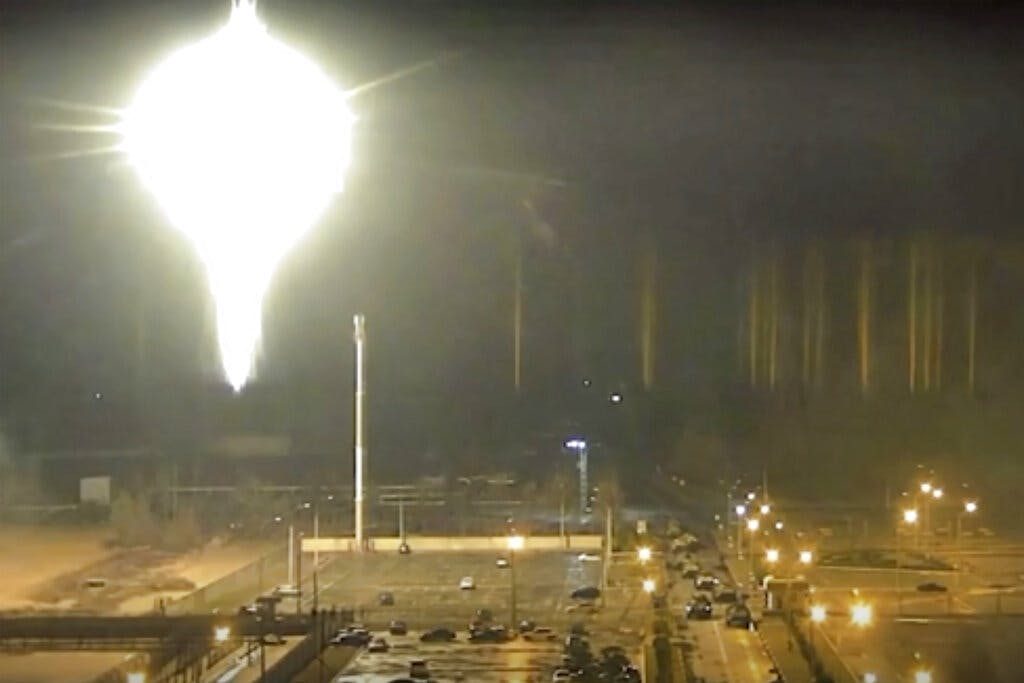Ukraine Nuclear Plant Appears Stable After Strike, but Zelensky Sounds Alarm
With Russian forces massed outside of Kiev and hit squads linked to Vladimir Putin said to be lurking in the shadows, Zelensky is currently in hiding.

Russia’s most notable overnight attack, on the eastern Ukrainian city of Enerhodar and its Zaporizhzhia nuclear plant — the largest in Europe — unfolded under frosty night skies with President Putin’s invasion now in its second week and another round of talks between the two sides producing an agreement to set up safe corridors to evacuate citizens, but still no ceasefire.
According to the Associated Press, the nuclear plant’s spokesman, Andriy Tuz, told Ukrainian television that Russian shells fell directly on the facility and set fire to one of its six reactors. That reactor is under renovation and not operating but there is nuclear fuel inside, he said.
After a tense night, the situation at the site seemed to calm somewhat and the BBC reported Friday morning that Russia has taken control of the plant and that “authorities say the facility is now safe and radiation levels are normal.” AP reported earlier that the U.S. energy secretary, Jennifer Granholm, said in a tweet that the Zaporizhzhia plant’s reactors were protected by robust containment structures and were being safely shut down.
Still, the assault triggered memories of the 1986 Chernobyl accident that occurred about 65 miles north of the capital, Kiev, widely agreed to be the world’s worst nuclear disaster. Today Ukraine has 15 nuclear power plants. Nowhere near the capital, the Zaporizhzhia plant is situated near the Black Sea, on the Dnieper River upstream from the Ukrainian city of Kherson, which Russian forces captured in recent days.
Although most experts read no signs of an impending disaster, that didn’t stop swift international condemnation, nor impede President Zelensky from peddling a sense of imminent destruction and doom. In an emotional speech in the middle of the night, AP reported, Mr. Zelensky said he feared an explosion that would be “the end for everyone. The end for Europe. The evacuation of Europe.” He added: “Only urgent action by Europe can stop the Russian troops. Do not allow the death of Europe from a catastrophe at a nuclear power station.”
With Russian forces massed outside of Kiev and hit squads linked to Vladimir Putin said to be lurking in the shadows, Mr. Zelensky is currently in hiding.
The alarmism of some of these statements in recent days, such as those regarding a Russian bombardment in Kiev said to have damaged a Holocaust memorial site, can be seen as an attempt to drum up more international support for the Ukrainian cause, though that has hardly been flagging and he must be keenly aware that there there are no plans afoot for any boots on the ground to eject the Russia invaders from Ukraine, other than Ukrainian ones. It does seem fair to wonder, though, whether premature statements about a nuclear plant emergency flirt with the inflammatory, risking unwarranted panic. Time will tell.
In the meantime, London’s Daily Mirror featured a front page with the plangent headline, “Talk to Me,” and a photo of Mr. Zelensky with hands outstretched; amid the mounting toll of destruction in Ukraine, he says there is “no other way to stop this war” than face-to-face talks with Mr. Putin. “Sit down with me. Just not 30 meters away like with” President Macron, the Guardian quotes the Ukrainian president as saying.
There has been much focus in the Western media about the widely touted economic sanctions against a range of Mr. Putin’s fat cat cronies, seen most tangibly in recent days with Germany’s seizure of an oligarch’s superyacht in Germany and scenes of economic fallout in Moscow. While some in Britain’s Labour party say the Conservatives have been dragging their feet on sanctions, Sky News reports that British ministers are now considering emergency legislation to push through sanctions on Russian oligarchs linked to Mr. Putin.
Stateside, it’s a different story: NBC News reports that Russian money flows through American real estate and despite sanctions Russians have spent years investing in properties. As President Biden vows to punish Russia with financial sanctions by seizing yachts, mansions, and other assets, NBC says, “members of the real estate community and lawmakers are skeptical about how successful he’ll be at getting access to the money Russians have been pouring into real estate for decades.” From Sunny Isles, Florida, to Cleveland and to high-rises in Manhattan, post-Soviet oligarchs’ money has flowed into big cities and the heartland in recent decades with little recourse, the report adds.
Israeli news site Ynet reports on a press conference in the Russian embassy in Tel Aviv Thursday during which the Russian ambassador, Anatoly Viktorov, complained that the press depicts Russia as “monstrous” and “there is incitement of hate towards Russians all over the world. Everything we say [is] immediately defined as propaganda.” Notably, if laconically, the ambassador added: “We hope to finish the battles fast.”

